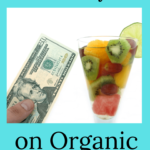The Best Way to Save Money on Organic Fruits and Veggies!
How to use strategy and mindfulness to save on your organic produce budget.
The easiest way to save money on organic produce is to simply stop buying it. I know that doesn’t sound helpful if you are wanting to limit your pesticide exposure, but there really is a way to be strategic about your organic purchases in order to save money.
It’s helpful to know that not all produce is created equal when it comes to pesticide absorption. Some test higher for pesticides (think spinach) and some much lower (like avocados). So when it comes to your organic produce buying budget, there are places that it’s important to consider buying organic, and some where you can skip it but still feel comfortable you are making good choices for your health.
But first, in order to really understand whether buying organic is helpful, it’s important to understand what we’re referring to in this post when we use the term “organic” and we also address whether or not buying organic is really all it’s cracked up to be.
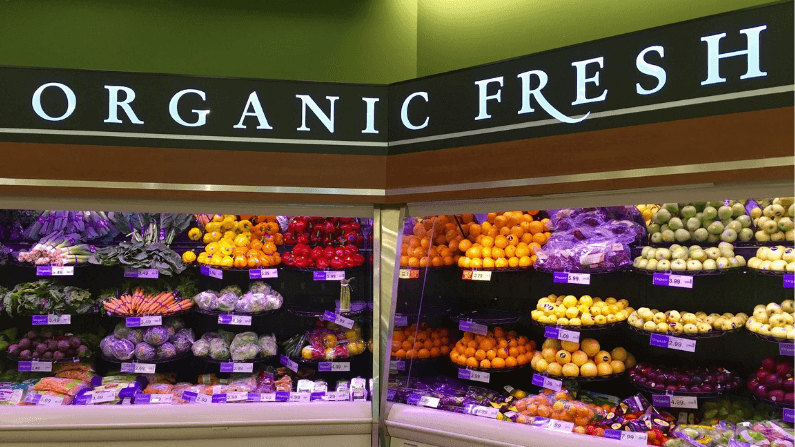
This post may contain affiliate links. Please read our disclosure for more info.
What does it truly mean to be organic?
When we at Mind Over Messy wanted to share the best way you can save money on organic fruits and veggies, including the handy print outs at the bottom of this post, we quickly discovered there is A LOT of controversy over what organic is and whether or not it’s even better for you.
There is a myth that organic means no pesticides were used. This is not the case! Organic produce has stricter rules about which pesticides can be used to qualify, but it still uses them.
Think about it, we really wouldn’t want to eat veggies with worms crawling in them and supposedly we are so picky about our produce here in the U.S. that we even reject “ugly” fruit (see: Half of all US food produce is thrown away, new research suggests.)
We likely need some pesticides, but which ones are used is an important distinction and which produce absorbs them the most is one of those things where knowledge is power.
Which pesticides are banned from organic produce?
We did a lot of research and it was surprisingly difficult to get clear information on what is required to be “organic” and what amount of pesticides are used in organic produce versus conventional produce. We finally weeded it down to a specific criteria that is helpful from the Mayo clinic. According to the mayo clinic, the following substances are not permitted in organic farming*:
- Synthetic fertilizers to add nutrients to the soil
- Sewage sludge as fertilizer (Gross!!!)
- Most synthetic pesticides for pest control
- Irradiation to preserve food or to eliminate disease or pests
- Genetic engineering, used to improve disease or pest resistance or to improve crop yields
- Antibiotics or growth hormones for livestock
Suspiciously, often times the claims that organic is not healthier could be traced back to farmers who did NOT follow organic criteria. Seriously, we found this article where supposedly organic pesticides were measured and it turned out it was misreported. The culprit? Someone who worked for conventional farms “accidentally” got the numbers incorrect. Suspicious, right?
Let’s just say, for every article we found about organic being better for you and the environment, there’s one to say it isn’t. But, there is suspicion around the articles saying it isn’t and whether or not they are tied to conventional farming.
It’s also important to note, that many of the articles that come up saying there is no difference between organic and non-organic produce are dated 2011-2012. We don’t know what happened after 2012, but the number of articles supporting conventional farming decrease dramatically after that year.
For purposes of making decisions about whether or not to buy organic produce, we decided to focus on the pesticide under the most controversy and being banned by entire cities – glyphosate.
Let’s talk about Glyphosate and Roundup
Basically, the chemical that is under the most controversy right now is Glyphosate and thankfully it is banned from organic produce. This chemical is largely under fire because of lawsuits such as THIS one and even cities are starting to ban it as a whole from being used anywhere in their communities. (See: Where is Glyphosate banned? and Third Roundup Trial Awards Plaintiffs $2 Billion Verdict)
The evidence that seems to be winning the cases against Roundup is the inclusion of the chemical polyethoxylated tallow amine in its formula, which allegedly makes it 50 times more toxic! The problem is, Monsanto, now Bayer (nice try changing the name as if we won’t know who it is anymore!), has a crap ton of money and a lot of political influence. In 2013 when the public was just beginning to discover the risks caused by Roundup, Monsanto actually managed to get a Monsanto Protection Act passed through Congress to protect their right to use the chemical over our right to make it illegal. (See: Monsanto Protection Act’: 5 Terrifying Things To Know About The HR 933 Provision.) Seriously, they found a way to pass a bill that made it possible to keep using their product as the public was discovering how unsafe it was. Thankfully the bill was repealed six months later, but sadly, the fight continues.
The bottom line? To be considered “organic” produce, glyphosate cannot be used. If you have concerns about Roundup and glyphosate, organic is the way to go. While it’s being shown that trace amounts are being found in all our foods, it is because Roundup is getting EVERYWHERE, not because organic farmers are using it. (See: Are You Eating Glyphosate? How Organic Farming Can Help.)
GMO’s are banned from organic farming
Additionally, if genetically modified organisms (GMO’s) are on your list of things you don’t want to ingest, organic is better as a whole as it is not allowed in organic farming. This even includes the corn that can be feed to animals in order for meat to be organic. If you eat meat, unless you buy organic it is likely you are inadvertently getting GMO corn because it’s in the diet of the animals. (See: GMO Feature: Corn.)

But do pesticides affect nutritional value?
This is another area where experts are saying yes and no to this question. Some articles, like THIS one from the Mayo Clinic, say that organic does have slightly more nutritional value than conventional produce and lower levels of pesticide residue. “Compared with conventionally grown produce, organically grown produce has lower detectable levels of pesticide residue. Organic produce may have residue because of pesticides approved for organic farming or because of airborne pesticides from conventional farms. The difference in health outcomes is unclear because of safety regulations for maximum levels of residue allowed on conventional produce.”
However, doctors seem to agree that eating ANY fruits and veggies, organic or otherwise, is better than not eating them. (See: The Downside of Going Organic.)
Basically, you should eat your fruits and veggies no matter what because they are good for. Seriously, our ancestors died on boats trying to get here because there wasn’t a way to have fruits the entire boat ride and people died of scurvy. We need our fruit! But if you want to reduce your pesticide exposure and avoid GMO’s, buying organic helps with that.
Can’t I just wash off the pesticides?
Washing your produce is ALWAYS a good idea. It isn’t just pesticides that are a concern with your produce, there are other things to worry about like E. Coli and bacteria.
So while there is much controversy on the internet about whether or not you can wash off the pesticides, there is much support for washing your produce to help in the reduction of bacteria.
Some claim that you can soak your produce in baking soda and/or vinegar to help reduce the pesticides. Whether or not that is the case is subject to debate, but washing off the bacteria seems to be the way to go NO MATTER WHAT. (See: How to Wash Vegetables and Fruits to Remove Pesticides.)
You can also buy a Fruit and Veggie wash like THIS ONE on amazon or at Whole Foods that you can spray on to clean them. The fruit and veggie wash claims to remove wax, chemical and handling residue easily.
So what can you do to help stay within your budget?
Follow the Dirty Dozen and Clean Fifteen.
The Environmental Working Group (EWG) tests a wide variety of produce every year and publishes a list of which items have the most pesticides and which have the least amount of pesticides. They cleverly call the most contaminated produce “the dirty dozen” and the least contaminated “the clean fifteen.”
Which means, when you see organic avocados priced up to $2 higher than their conventional counterpart, you can skip it. But if you see apples are 20 cents more per pound for organic, you may want to consider it.
We’ve created handy lists you can print to take with you to the grocery store or you can Pin this post for later so you can access it while you’re shopping. The EWG also has laminated tags available for purchase HERE that you can attach to your reusable bags to reference during your shopping.
These lists show you which produce to buy organic (any off the Dirty Dozen list which is in the order of the most contaminated) and which it is safer to buy conventional and save money (the Clean Fifteen list items):
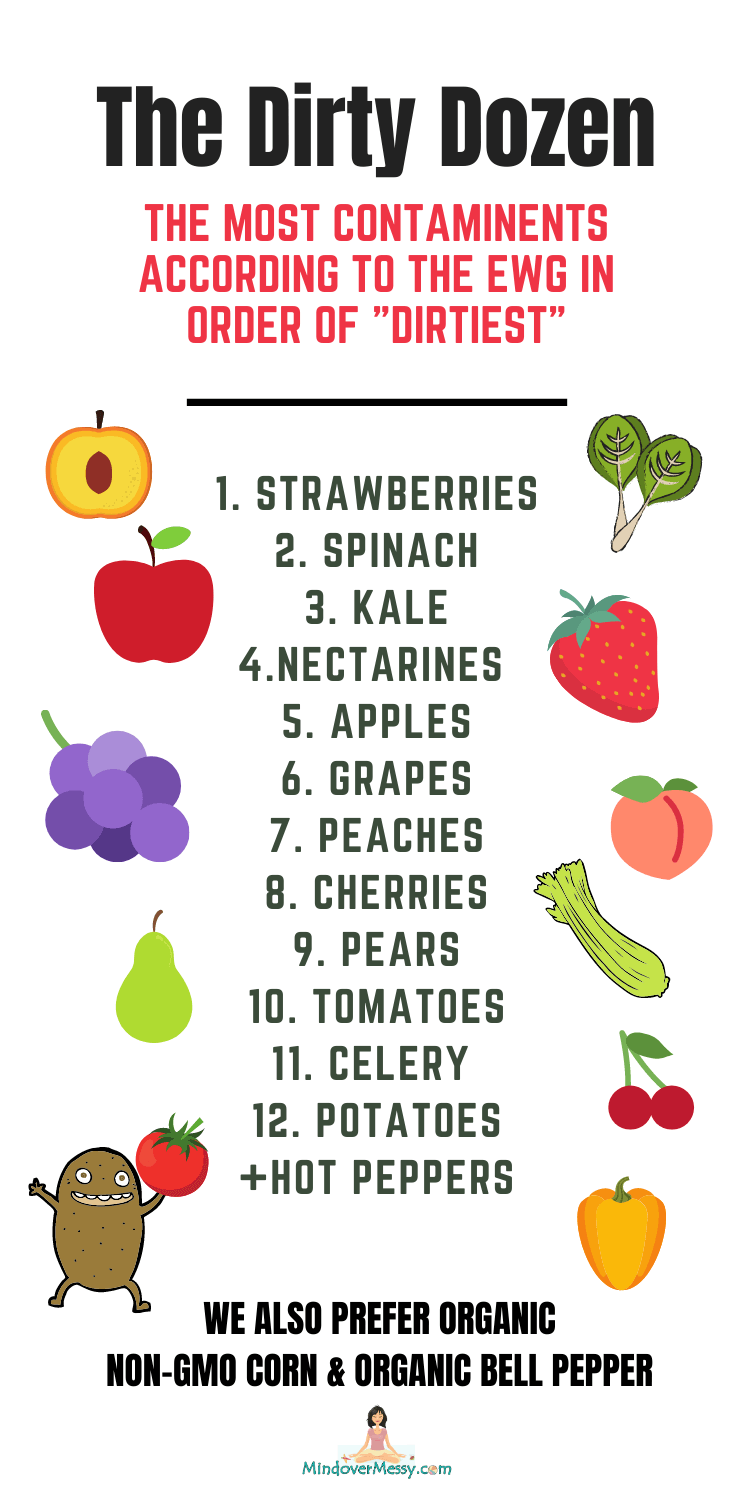
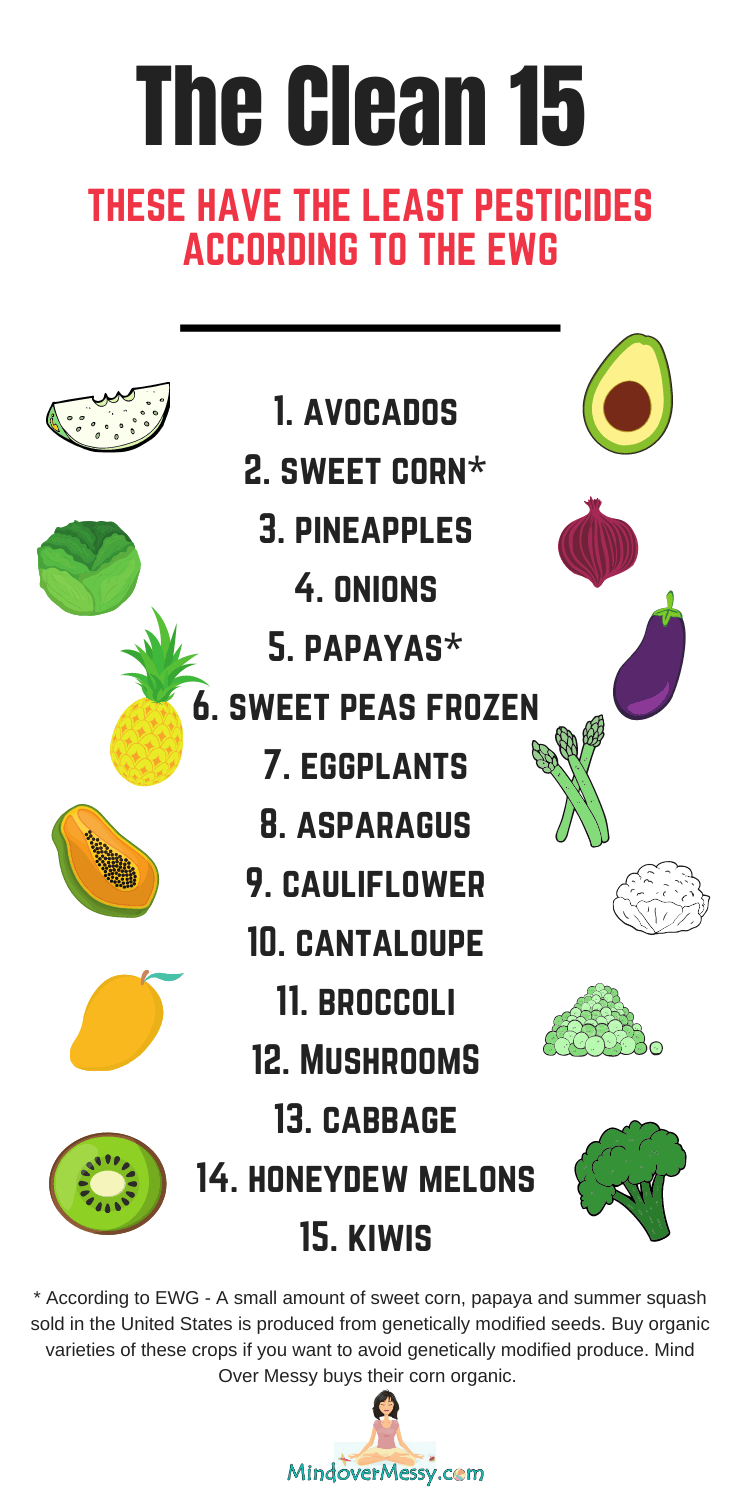
Don’t forget your local farmer’s market!
Your local farmer’s market is also extremely helpful to get organic produce. Just make sure to ask at each booth if you don’t see a certified organic sign to make sure. You can often get deals on produce and buying local even means saving gas on produce transportation – which is an added bonus for our environment! Some farmer’s markets have “fire sales” toward the end of the day to get rid of unsold produce they don’t want to pack up and also bruised fruit for jams, pies, and smoothies.
Use your good old intuition!
You can get a sense of which produce to buy by being mindful and tapping into your intuition more. Ask yourself which feels brighter and lighter? Which feels sad and like you should shy away from it? Seriously, the more connected you are with your intuition, the more helpful it is at the grocery store. If you feel like something feels “off,” skip it. If you are drawn to the in-season fruit and craving it, get it! Your intuition knows what your body needs and will help you when making these decisions.
The one thing I will say is we tend to feel the organic apples have a higher vibration as do potatoes. I could be wrong, so take a breath, relax your mind before you buy them and see what you sense. In my area, I always buy organic apples and potatoes, but peaches – not every time.
Let us know how you feel about organic produce. Are you buying it? Too expensive? Notice a difference? We’d love to hear from you in the comments.

Pin for later to reference from the grocery store:
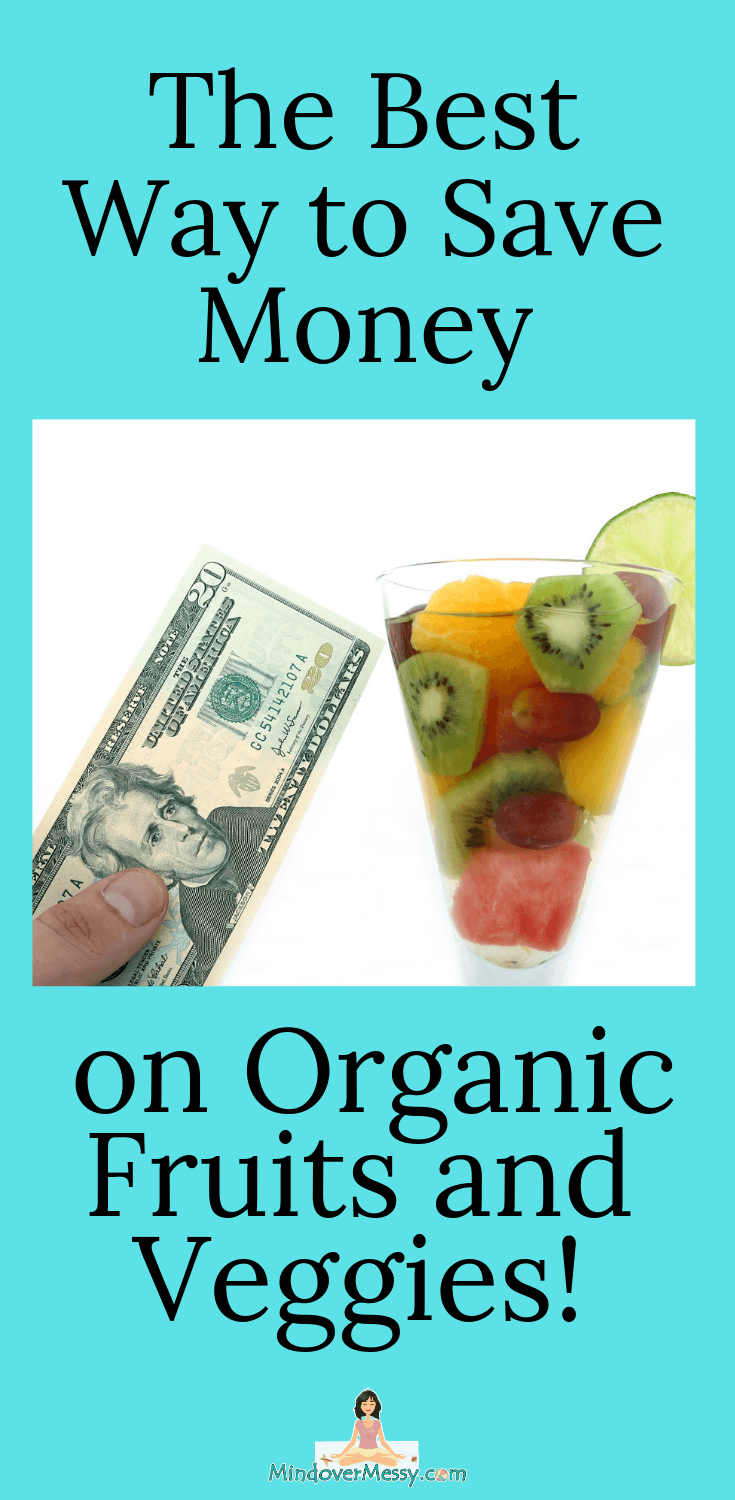

Nicole is the Creator/Editor for Mind Over Messy. She has two "spirited" boys and a family that loves adventure. From enjoying a home cooked meal to night snorkeling in Hawaii, you can find it on this website. If you're interested in Guest Posting on MindOverMessy.com, click HERE for more information.

Nicole is the Creator/Editor for Mind Over Messy. She has two "spirited" boys and a family that loves adventure. From enjoying a home cooked meal, meditating, being present for even the most challenging moments, to night snorkeling in Hawaii, you can find it on this website. If you're interested in Guest Posting on MindOverMessy.com, click HERE for more information.

